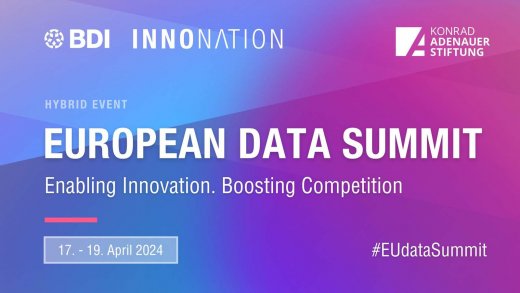How data spaces can help organisations to cross the Valley of Death

Today’s economy is undergoing a dual transformation. On the one hand, organisations are under pressure to digitalise, while on the other they must also improve their sustainability. In this blog, to tie in with the EU Data Summit in Berlin, we outline a way to take a digitally sustainable approach to data. This will help organisations to cross the ‘Valley of Death’, and successfully transition from architectural blueprint-driven initiatives with a high research connotation, into thriving business driven ecosystems.
This year’s EU Data Summit zooms in on the challenges at the heart of the EU Data Strategy’s aim to create a ‘fair data economy’. Besides the complexities associated with fostering fair global competition and comprehensively regulating the dynamic and increasingly open environment, the summit focuses on both the digital transformation and sustainable transformation that organisations are currently facing. We believe that successfully navigating this dual transformation calls for a ‘digital sustainability’ mindset and approach. But what exactly do we mean by digital sustainability?
The importance of digital sustainability
At the fundamental level, digital sustainability means extending environmental, social and governance (ESG) considerations to the digital world as well as the physical world. For example, the huge data centres that form ‘the cloud’ should be energy efficient, and the armies of real people training AI models should have the same human rights as employees in other industries.
But in a wider context, digital sustainability is about agency over one's personal and business data, generating long-term value, transparency and equity for all parties. And that equity may not necessarily only be in monetary terms; there may be other, less tangible ways in which people and businesses could receive a fair share of the benefits when providing their data in order to gain access to products or services. Digital sustainability is also about offering viable alternatives to the non-explicit trade-offs that people have become accustomed to in this age of the Big Tech platforms.
Data spaces are ramping up
Digital sustainability has recently been boosted by the EU Data Strategy, which has introduced the concept of ‘data spaces’. These are strategic initiatives aimed at making more data accessible and reusable for the benefit of European businesses and citizens, while empowering data holders to be in control of their data. Each sector-specific data space creates a trustworthy and secure environment for data sharing, and is the sum of all its participants, including data providers, users and intermediaries.
The development of data spaces is now ramping up – supported by the ever-growing need for data, guard-railed by EU data laws, and stimulated by the EU Digital Programme and the Data Space Support Centre. However, many organisations are currently struggling to cross the ‘Valley of Death’. For example, they are having a hard time transitioning from architectural blueprint-driven initiatives with a high ‘research connotation’, to thriving ecosystems business driven innovation. They face difficulties closely tying their current data space efforts with the business, or they are getting lost in the seemingly isolated worlds of GDPR, data spaces, Digital Identity Wallets and the like. As a consequence, they have trouble finding a clear path from ‘where they are now’ to ‘where they want to be’ in data space land.
At INNOPAY, we believe it is time to seize back trust and control by shaking up the existing data-sharing infrastructure. To deliver on the promise of a digitally sustainable data economy, we just need to ensure that data spaces are a success. The three key ingredients for this are:
Cross the artificial divide between personal and non-personal data
The current thinking about data is dominated by an artificial divide between ‘personal’ and ‘non-personal’ (i.e. ‘business’) data. This divide is counterintuitive when striving for a human-centric approach and digital sovereignty. Additionally, on a practical level, ignoring personal data will limit the overall potential to roll out use cases that bring positive benefits for a wider public. After all, personal data can be found in numerous sectors – from finance and health, to mobility and employment. It is therefore necessary to cross this legal divide. The good news is that the legal infrastructure already exists to handle personal data in a digitally sustainable manner (e.g. the Data Governance Act, data intermediaries). The next step is to show how to deal with personal data in the data space realm based on clear examples of best practices.
Focus on adoption
It’s time to shift the focus on what drives real adoption. From a business perspective, this means helping businesses to support high frequency use cases, develop new business models and set up pilots. Develop clear roadmaps and share blueprints and best practices that can help them from their current ‘as is’ phase to their aspired ‘to be’ situation. From a policy perspective, it is necessary to cater to interoperability by focusing on interoperability at all levels: legal, organisational, semantic and technical.
Start now
Businesses can and should start reaping the benefits of sharing data through data spaces right now. INNOPAY has developed a 7-step guide outlining how giving customers control over their data can be instrumental in solving business issues and/or delivering new value through innovative or improved products and services.
Core fabric of the data economy
Data spaces are the core fabric of an interconnected and competitive European data economy. A digitally sustainable approach is fundamental to the successful implementation of data spaces to enhance the development of new data-driven products and services in the EU. Only then will we be truly able to unleash the enormous potential of data-driven innovation and secure Europe’s future in the digital age.
Want to know more?
Attend our panel discussion at the EU Data Summit in Berlin.





